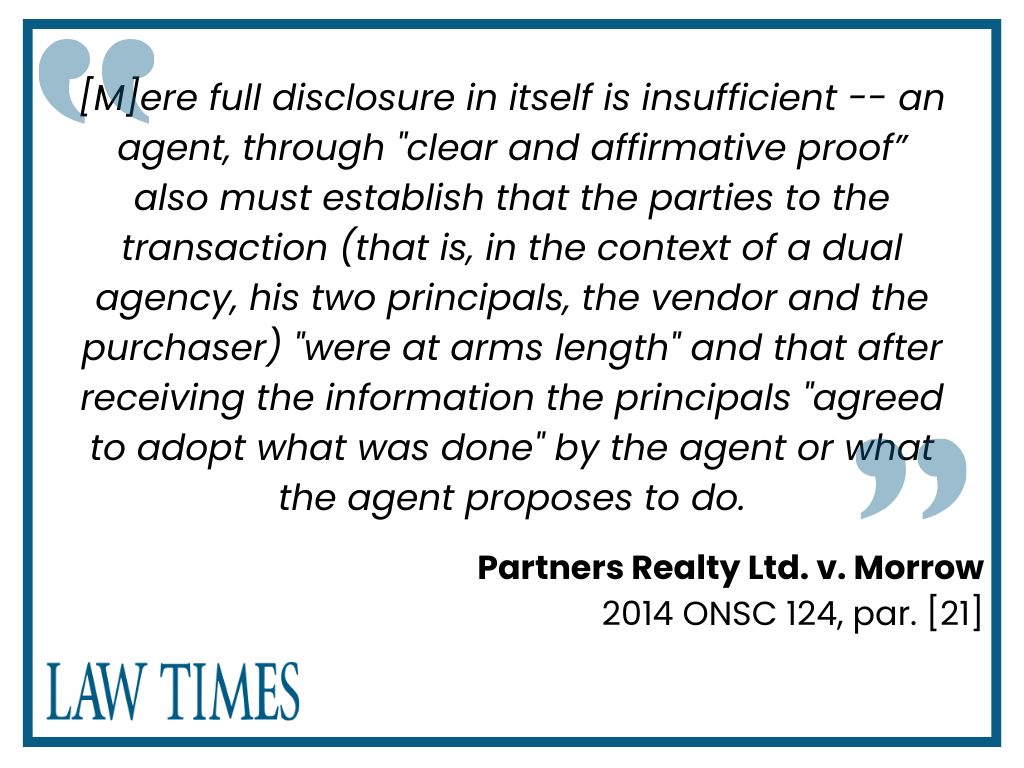
Learn about the rules on dual agency in Ontario, how it applies to real estate transactions, and if agents are prohibited (or not) in doing these arrangements

In dual agency, real estate agents may at times act for both the buyer and the seller in a transaction. But if they’re not careful, their entire commission from the deal could be in jeopardy. Here, we’ll discuss when dual agencies are allowed in Ontario, and their legal implications for both the clients and the agents engaged in real estate transactions.
Dual agency refers to an instance where both the seller and the buyer in a real estate transaction are represented by a similar agent or brokerage. In Ontario, this is also known as multiple representation, while other provinces may have other formal names for these arrangements. While this practice is not entirely prohibited in Ontario, it’s a highly monitored and regulated area by the law and professional regulators.
The following are the instances where dual agencies or multiple representations may happen:
when the same brokerage has:
Dual agency or multiple representation is allowed in Ontario, but it is subject to certain conditions for it to become legal. There are two ways to look at it:
In any case, all parties to a real estate transaction (the buyer and the seller), including the agent, should be aware of these laws and regulations. Otherwise, the transaction may be affected, and sanctions be imposed on the agent and their brokerage.
Here’s a video that briefly explains dual agencies in Ontario and how it differs from the other provinces in Canada:
For more information on dual agency, reaching out to the lawyer of a specific area can be helpful. Check out this Special Report from Canadian Lawyer Magazine, one of our sister publications, on the Top Law Firms in Ontario.
Multiple representation is one of the things governed by the Real Estate Council of Ontario (RECO). It is the regulatory body that registers and governs all salesperson, brokers, and brokerages in the province. With this, the RECO administers the Trust in Real Estate Services Act (TRESA) of Ontario, which was previously the Real Estate Business Brokers Act (REBBA).
The RECO Bulletin No. 3.2 is its latest regulation on multiple representation or dual agency. Under this Bulletin, a brokerage or agent is prohibited from representing more than one client in the same trade, unless these conditions are met:
(1.) required disclosure: a mandatory written disclosure is executed by the brokerage or the agent involved in the same transaction
(2.) acknowledgment from the clients: best efforts are made to obtain an acknowledgement from the existing or prospective clients that they received the mandatory written disclosure
(3.) consent of the clients: after receiving the disclosure and if the clients agree (the buyer and the seller), they provide a written consent, either to the brokerage or agent, allowing them to continue representing the clients in the same trade
There must also be awareness of the policies that the different organizations impose on their members when it comes to dual agencies or multiple representations. The Ontario Real Estate Association (OREA) restricts dual agencies through its agreement of purchase and sale and pre-printed representation agreements. As highlighted by OREA, what’s important is that both clients consent in writing when it comes to the dual agency arrangement.
Again, multiple representations or dual agencies are allowed by the RECO and the real estate organizations, but subject to certain conditions. However, an agent’s brokerage internal policies may provide otherwise, such as by entirely prohibiting this practice. For instance, a brokerage may prohibit the same agent from representing both the seller and the buyer in a similar transaction.
Although dual agencies may be allowed after complying with some pre-requisites, they still come with some risks, especially on the part of the real estate agent. Faithful compliance with these requisites is highlighted in Ontario’s common law on dual agency, as in the case of In Partners Realty Ltd. v. Morrow, 2014 ONSC 124.
Here, the Ontario Superior Court ruled that the failure to disclose the dual agency constituted a material breach in the listing agreement. The result was the loss of almost $18,000 in commission.
“It’s sort of the classic case of you can’t always rely on the client to pick up on things,” said Kerry Fox, a Nepean-based lawyer who focuses on real estate and family law. “You’ve got to sit down with the client and draw their attention to it.”
In Partners Realty, the broker, Royal Lepage, went after the seller, Rosalind Morrow, for the commission after she refused to close. Morrow charged that the broker was in breach of the agreement by failing to disclose that they're also representing the buyer. She alleged that, as a result, the Royal Lepage’s real estate agent Kara-George was in material breach. Morrow said it was only later, when the broker pursued her for the commission of $17,788.75, that she learned the agent had entered into a buyer agency agreement.
“There was no causal relationship between the vendor’s refusal to pay the real estate commission and the existence of this dual agency relationship,” Fox said. “There was just this extra reason she latched onto to not pay the commission.”
When Morrow eventually refused to close, Royal Lepage insisted on the payment of the agreed-upon commission. However, Morrow charged that:
Had she known the agent was also acting for the buyer, Morrow said, she wouldn’t have signed with Royal Lepage.
According to Royal Lepage, Kara-George explained the dual agency situation to Morrow several times. She also left a package for Morrow to read that included the listing agreement and agency brochure. The agent said that she had explained the situation again when she presented the offer to purchase.
The judge, however, found otherwise. Justice Andra Pollak concluded that Kara-George did not review the dual agency provision of the agreement with Morrow. It was also held that:
Disclosure, then, was a key issue. “The question often is whether the agent can represent both sides of the deal equally,” said Jamie Spotswood, a commercial litigation lawyer and partner at Clyde & Co. “A big issue in this case is how was it disclosed and the nature of the disclosure obligation.”
Ultimately, Spotswood feels a natural conflict arises for the dual agent. The situation makes the agent’s responsibility to fully disclose that position even more important because risks are inherent in situations of conflict.
In Partners Realty, the court found leaving behind a pamphlet and reviewing the dual agent status wasn’t enough to fulfil the disclosure obligation, which flows from the agent’s fiduciary duty. As a result, says Spotswood, the agent must be diligent with the disclosure and ensure the clients understand the situation.
“The simple rule is that an agent cannot serve two masters,” said Toronto-based lawyer Lisa Laredo. The exception to the rule, she added, is where the agent fully discloses:
“In addition, the agent must show that the decision by the principal was taken after having received the information and having agreed to accept the agent’s recommendation.” The basis of the rule, Laredo said, is to avoid an appearance of a conflict of interest and the possibility of any hidden benefit to the agent one of the parties was unaware of.
Matt Maurer, who practises litigation and real estate law, wondered whether the judge would have taken such a strict view of the dual agency issue if the sale hadn’t fallen through. It wasn’t the status of the agent representing both sides that caused the deal to die. “The judge basically said, ‘That’s too bad. That’s a breach of the contract,’” he said. “There was evidence from the seller that if she had known the agent was acting for both, she wouldn’t have signed the agreement.”
Maurer found the concept of the dual agent to be intriguing. It’s in the interest of the agent to act for both the seller and the buyer because it avoided having to split the commission. It’s an important issue given the frequency of bidding wars that have become particularly common in markets like Toronto. Maurer suspected that the situation could lead to more questions in the future.
“It’s an interesting case for me . . . just because of how crazy the Toronto real estate market is right now,” he said. “What’s really going to come out in the next little bit, there’s not a lot of regulation, to my knowledge, on how the bidding war is conducted. What’s acceptable practice for getting the most you can for the seller?”

At the expense of fully representing their client, the agent and brokerage benefit the most from dual agencies because of their most sought-after opportunity: double commission. By representing the seller and the buyer, both their commissions are handed to that same agent or brokerage.
However, all the comfort of dual agencies or multiple representations comes with some dangers. This does not only pertain to both their clients, but also to the agent and the brokerage. Below are some of the disadvantages of dual agencies or multiple representations:
As a clearer example of how dual agencies or multiple representations may be disadvantageous in some situations, watch this video:
Another tool to use when looking for lawyers is this directory from Lexpert, another of our sister publications, which lists the Lexpert-ranked best lawyers in Ontario. This directory can also be filtered per city in every province or territory.
Aside from those mentioned in the video, another disadvantage of engaging in dual agencies is the risk of going through lengthy and costly litigation. When utmost care was not exercised in these types of arrangements, any slight problem may cause a domino effect, resulting in cases filed in court. This is true, especially when the dispute cannot be resolved among the parties themselves.
This is also why some brokerages prohibit dual agencies, even though it’s not entirely prohibited in Ontario by law or by the regulating authorities. When a case is filed against their agent, a brokerage is also affected by that litigation, in one way or another. To avoid going through this stressful process, some brokerages take it upon themselves to limit their own agents’ representation.
While dual agencies or multiple representations are allowed in Ontario, it comes with significant risks and responsibilities for both agents and their clients. Agents must ensure full disclosure and obtain written consent; otherwise, it can lead to costly legal consequences, including the loss of commission. On the other hand, clients should also be fully informed about the dual agency to prevent potential conflicts of interest and other disputes. As such, reaping the benefits of dual agencies also comes with some perils that agents and brokerages must be mindful of.
Aside from the new rules on dual agency, you can be updated on other related issues by bookmarking our practice area page on Real Estate law.
The lawyers quoted in this updated article were interviewed by Law Times in 2014 for an article when the case of Partners Realty Ltd. v. Morrow was just recently decided.